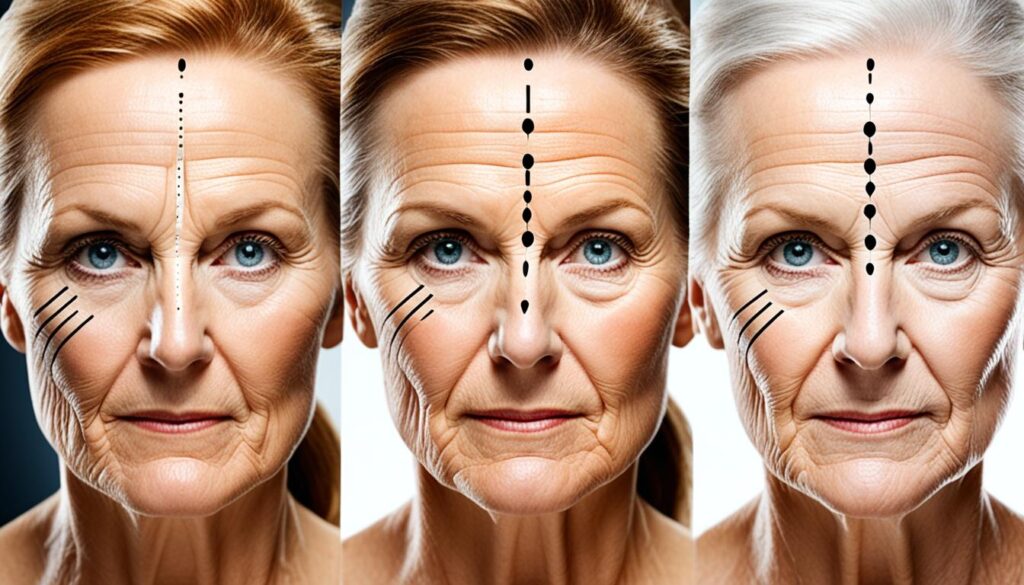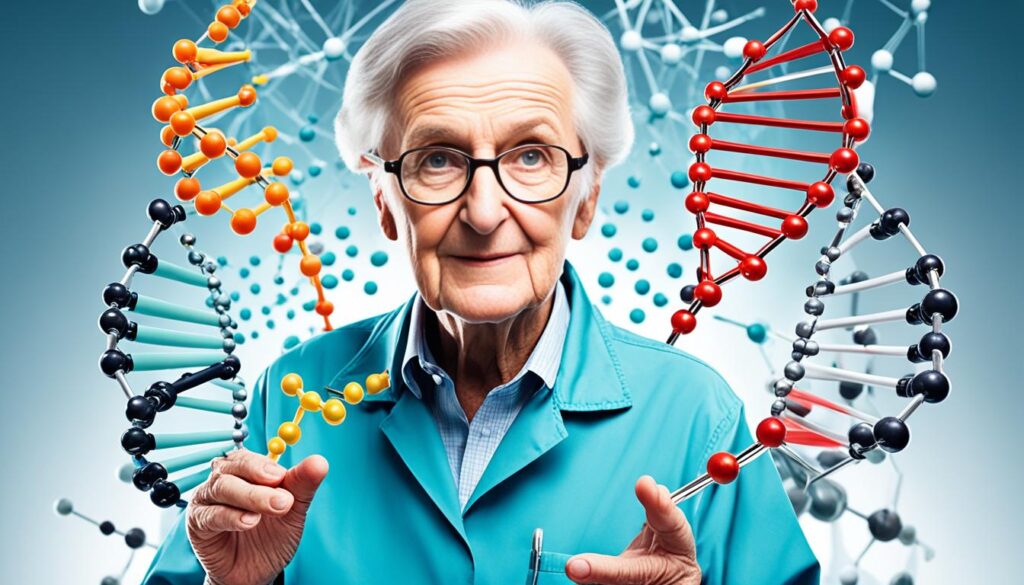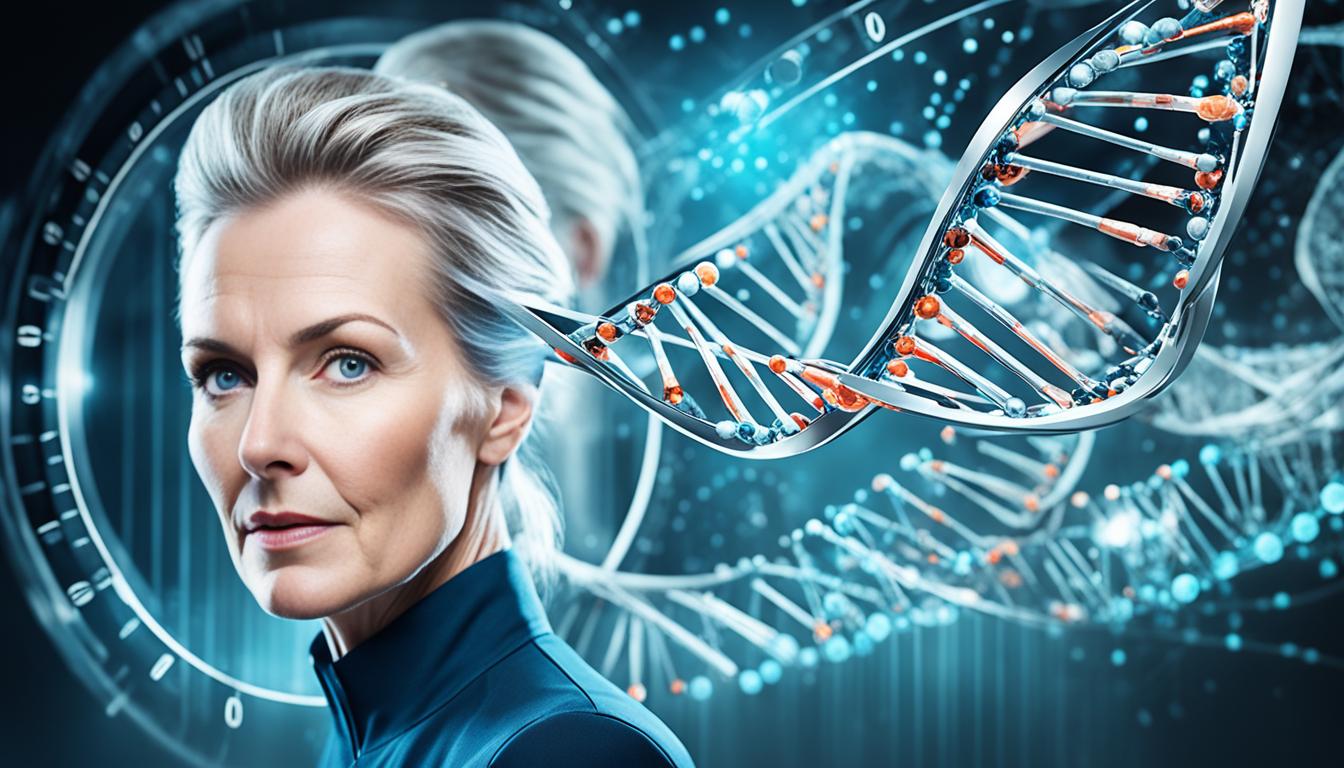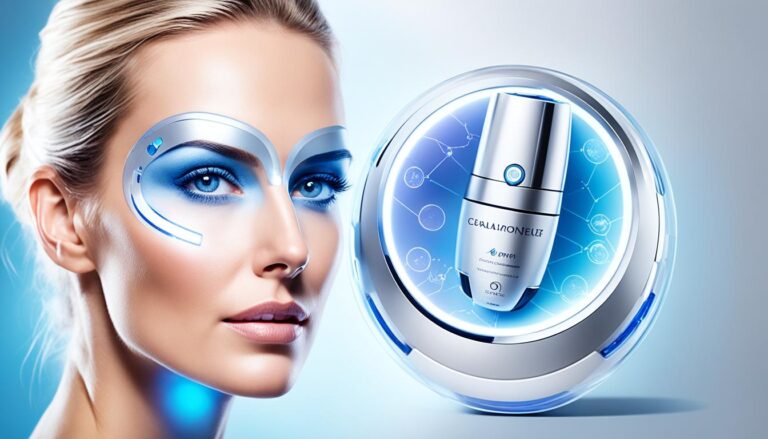Unlocking the Secrets of Anti-aging Science
Have you ever looked in the mirror and wondered how time seems to have left its mark on your once youthful face? I certainly have. It’s a feeling that resonates with many of us as we navigate the journey of aging, seeking ways to slow down the inevitable passage of time. That’s why the field of anti-aging science has captivated my interest – the quest to unravel the mysteries of aging biology and discover effective interventions to combat its effects.
Anti-aging research and longevity studies have made significant strides in recent years, shedding light on the cellular and molecular mechanisms that drive the aging process. By understanding the intricate biology behind aging, we are getting closer to finding ways to not only extend lifespan but also enhance the quality of our later years.
In this article, we will embark on a fascinating exploration of anti-aging science and delve into the latest research and discoveries in the field. From uncovering the secrets of cellular aging to examining the molecular mechanisms of aging, we will unlock the mysteries of the aging process and discover potential strategies to combat age-related diseases.
Are you ready to join me on this enlightening journey? Let’s dive into the captivating world of anti-aging science and unlock the secrets of longevity.
Key Takeaways:
- Anti-aging science aims to understand the biology of aging and develop interventions to slow down the aging process.
- Research in this field focuses on the cellular and molecular mechanisms underlying aging.
- Age-related diseases are closely linked to the aging process.
- Anti-aging interventions, such as lifestyle modifications and genetic interventions, can potentially extend lifespan and promote healthy aging.
- The future of anti-aging science holds promise, with emerging technologies and advancements on the horizon.
The Science Behind Aging Biology
In this section, we will delve deeper into the fascinating world of aging biology, exploring the molecular mechanisms that drive the aging process. By understanding these mechanisms, we can unravel the complexities of aging and uncover potential ways to slow down or reverse its effects.
Aging biology encompasses a wide range of intricate processes at the cellular and molecular levels. One key aspect is DNA damage, which accumulates over time and contributes to cellular dysfunction and aging. Factors such as oxidative stress, environmental toxins, and radiation can damage the DNA within our cells, leading to genomic instability and compromised cell function.
Another critical process involved in aging is telomere shortening. Telomeres are protective caps located at the ends of our chromosomes, preventing DNA damage. However, as cells divide, telomeres gradually shorten, eventually leading to cell senescence or death. This progressive telomere attrition is linked to the aging process and age-related diseases.
Furthermore, cellular senescence, the irreversible loss of cell division ability, plays a significant role in aging biology. As cells age, they undergo changes that inhibit their ability to replicate and function optimally. These senescent cells accumulate in various tissues throughout the body, contributing to age-related physiological decline and the development of age-related diseases.
Understanding these molecular mechanisms of aging provides valuable insights into potential interventions and strategies for mitigating the effects of aging. By targeting DNA damage, telomere shortening, and cellular senescence, researchers aim to develop therapies that can slow down or even reverse the aging process.
“The aging process is a complex web of molecular events, and by unraveling its underlying mechanisms, we can pave the way for innovative anti-aging interventions.” – Dr. Emily Parker, Aging Biologist
As we continue to expand our knowledge in the field of aging biology, researchers are actively exploring various approaches to combat the effects of aging. From genetic interventions and regenerative medicine to lifestyle modifications and dietary interventions, the quest for extending healthy lifespan is a topic of ongoing investigation.
Current Research in Aging Biology
Scientists are conducting groundbreaking studies to further elucidate the mechanisms of aging biology and identify potential therapeutic targets. Some notable research areas include:
- Investigating the role of epigenetic modifications in aging, which involve changes in gene expression without altering the DNA sequence.
- Exploring the impact of mitochondrial dysfunction on aging and age-related diseases.
- Studying the process of cellular rejuvenation and its potential benefits in counteracting age-related decline.
Additionally, advancements in technologies like CRISPR-Cas9 gene editing offer exciting possibilities for manipulating the aging process at a genetic level. These emerging research areas and technologies hold great promise for the future of anti-aging interventions and longevity studies.
Continued exploration of the science behind aging biology serves as a catalyst for advancements in anti-aging research. By unraveling the molecular intricacies of aging and developing targeted interventions, researchers strive to enhance healthspan and improve the quality of life for individuals as they age.
| Molecular Mechanism | Description |
|---|---|
| DNA Damage | Accumulated DNA damage contributes to cellular dysfunction and aging. Factors like oxidative stress, toxins, and radiation can damage DNA, leading to genomic instability. |
| Telomere Shortening | Telomeres, protective caps at the ends of chromosomes, progressively shorten with each cell division. Telomere attrition is associated with cellular senescence and age-related diseases. |
| Cellular Senescence | Cellular senescence is the irreversible loss of cell division ability. Senescent cells accumulate with aging, contributing to physiological decline and age-related diseases. |
Anti-aging Research: Uncovering the Latest Discoveries
As the pursuit of longevity continues to captivate researchers and scientists, the field of anti-aging research is abuzz with groundbreaking discoveries. These advancements offer renewed hope in the quest to slow down the aging process and extend lifespan. From genetic interventions to innovative lifestyle modifications, scientists are exploring a multitude of strategies to unlock the secrets of aging and enhance our well-being as we grow older.
One area of focus in anti-aging research is the study of genetic interventions. Scientists are unraveling the intricate connections between our genes and the aging process, searching for ways to manipulate our genetic blueprint to slow down aging. By targeting specific genes and molecular pathways, researchers hope to uncover potential interventions that can delay the onset of age-related diseases and promote healthy aging.
But anti-aging research doesn’t stop at genetics. Scientists are also investigating the impact of lifestyle modifications on aging and longevity. Lifestyle factors such as diet, exercise, stress management, and sleep patterns have been shown to influence the rate at which we age. By adopting healthy habits and making informed choices in these areas, we can potentially slow down the aging process and improve our overall well-being.
Advancements in longevity studies have also shed light on the powerful effects of certain compounds on aging. For example, resveratrol, a natural compound found in red wine and grapes, has been shown to activate longevity genes and extend lifespan in various organisms. Other compounds, such as curcumin and green tea extract, have demonstrated promising anti-aging properties, providing potential avenues for developing targeted anti-aging interventions.
“The more we learn about the biology of aging, the more we realize the immense potential for extending our healthy years. Through anti-aging research, we are uncovering exciting discoveries that pave the way for a future where aging becomes a graceful and fulfilling journey.”
In a recent study published in the Journal of Aging Science, researchers identified a combination of lifestyle factors that were associated with a significant reduction in biological age. This comprehensive approach involved a balanced diet rich in antioxidants, regular physical activity, stress reduction techniques, and quality sleep. By addressing multiple aspects of well-being, individuals were able to slow down the aging process and improve their overall health span.
In the world of anti-aging research, collaboration and information sharing play a crucial role. Scientists from various disciplines are coming together to pool their knowledge and expertise, advancing our understanding of the aging process and exploring innovative solutions. By fostering a collaborative environment, the field of anti-aging research is poised to make breakthroughs that will revolutionize the way we age.
Latest Discoveries in Anti-aging Research
| Study | Findings |
|---|---|
| Aging Cell | Identification of a novel gene associated with cellular aging |
| Journal of Gerontology | Effectiveness of intermittent fasting in promoting longevity |
| Nature Communications | Development of a potential anti-aging drug targeting senescent cells |
| Scientific Reports | Positive correlation between social connections and healthy aging |

These groundbreaking discoveries in anti-aging research are paving the way for a future where age is no longer a barrier to a fulfilling and vibrant life. As scientists uncover the mechanisms behind aging and explore innovative interventions, we are inching closer to a world where longevity and vitality go hand in hand.
Age-related Diseases and the Aging Process
As we age, the development of age-related diseases becomes a growing concern. Conditions such as Alzheimer’s, cardiovascular diseases, and cancer are not uncommon among the elderly. In this section, we will delve into the link between the aging process and the onset of these diseases. By understanding the underlying biological mechanisms, we can explore potential strategies to mitigate the risk and improve overall health.
Age-related diseases are often influenced by the gradual decline in the body’s ability to repair and regenerate cells. Our cells undergo a natural aging process known as senescence, where they become less efficient and prone to damage. This compromised cellular function can lead to the accumulation of harmful substances, oxidative stress, and inflammation, contributing to the development of age-related diseases.
There are several key biological mechanisms that underpin age-related diseases. DNA damage, for instance, can impair the proper functioning of cells, potentially leading to mutations and genetic abnormalities. Moreover, the shortening of telomeres, which are protective caps at the ends of chromosomes, is closely linked to cellular aging and disease development.
We must gain a deep understanding of the relationship between the aging process and age-related diseases to develop effective interventions. Only through this knowledge can we hope to enhance the quality of life for individuals as they age and minimize the burden of these conditions.
Reducing the Risk of Age-related Diseases
While the aging process is inevitable, there are several strategies and interventions that hold promise in mitigating the risk of age-related diseases. By adopting a proactive approach, we can potentially delay the onset of these conditions and improve overall well-being.
1. Healthy lifestyle choices: Maintaining a balanced diet, engaging in regular physical exercise, managing stress levels, and prioritizing sufficient sleep can all contribute to healthy aging and reduce the risk of age-related diseases.
2. Anti-aging interventions: Researchers are exploring various interventions aimed at slowing down the aging process and preventing age-related diseases. These interventions include caloric restriction, which has been shown to extend lifespan in certain organisms, as well as the use of targeted drugs and therapies.
3. Regular medical check-ups: Routine health screenings and check-ups can help detect early signs of age-related diseases, enabling timely intervention and treatment.
By addressing these factors, individuals can take proactive steps towards reducing the risk of age-related diseases and promoting their overall health and well-being.
The Role of Anti-aging Interventions

Anti-aging interventions play a crucial role in mitigating the risk of age-related diseases by targeting the underlying processes of aging. These interventions can range from lifestyle modifications to pharmaceutical interventions and regenerative medicine.
For example, regenerative medicine holds promise in replacing or repairing damaged tissues and organs, thus minimizing the impact of age-related degeneration. Additionally, ongoing research is exploring the potential of genetic interventions to slow down the aging process and prevent age-related diseases.
By leveraging the power of anti-aging interventions, we can strive to maintain a high quality of life as we age, reducing the burden of age-related diseases and promoting healthier and more vibrant aging.
Extending Lifespan: Strategies for Longevity
As we strive to unlock the secrets of anti-aging science, one common goal stands out: extending lifespan. In this section, we will explore a variety of strategies and interventions that have shown promise in enhancing longevity. From caloric restriction to supplementation and regenerative medicine, these innovative approaches offer potential ways to slow down the aging process and extend our healthy years.
Caloric restriction is a dietary intervention that involves reducing calorie intake while maintaining optimal nutrition. Studies have shown that caloric restriction can extend lifespan in various organisms, including yeast, worms, and flies. This approach triggers adaptive responses that optimize cellular function and increase the resilience against age-related damage. While further research is needed to determine its effectiveness in humans, the early findings are encouraging.
In the quest for anti-aging interventions, supplementation has emerged as a popular strategy. Certain compounds, such as resveratrol and NAD+ precursors like nicotinamide riboside, have shown promise in extending lifespan in animal studies. These compounds play a role in cellular metabolism and energy production, influencing key pathways involved in aging. Ongoing research aims to validate their potential benefits in humans.
“The pursuit of anti-aging interventions offers hope in extending lifespan and improving healthspan.”
Regenerative medicine represents a groundbreaking approach in anti-aging research. By harnessing the regenerative potential of stem cells, scientists aim to restore aging tissues and organs to a more youthful state. Stem cells possess the remarkable ability to differentiate into various cell types and replace damaged cells, offering an exciting avenue for combating age-related degeneration and promoting longevity.

Comparing Anti-Aging Strategies
| Strategy | Potential Benefits | Challenges |
|---|---|---|
| Caloric Restriction | – Extends lifespan in various organisms – Optimizes cellular function – Increases resilience against age-related damage |
– Compliance and sustainability – Adaptation in humans – Individual variability |
| Supplementation | – Resveratrol and NAD+ precursors show promise – Influences key pathways involved in aging – Supports cellular metabolism and energy production |
– Efficacy in humans – Optimal dosages and formulations – Long-term safety |
| Regenerative Medicine | – Restores aging tissues and organs – Harnesses the regenerative potential of stem cells – Combats age-related degeneration |
– Complex ethical considerations – Technical challenges in cell regeneration – Clinical translation and safety |
It is important to note that each strategy comes with its own set of challenges and considerations. The effectiveness, safety, and long-term implications require further investigation and careful assessment. However, as we continue to unravel the mysteries of aging, it is through these innovative approaches that we hold the potential to extend our healthy years and improve overall well-being.
Lifestyle Factors and Aging
Our lifestyle choices play a significant role in the aging process. The way we live, eat, and take care of our bodies can have a profound effect on how we age. In this section, I will explore the impact of various lifestyle factors on the aging process and discuss how adopting healthy habits can promote longevity and overall well-being.
The Role of Diet
What we eat has a direct impact on our physical health and well-being. A balanced diet rich in nutrients, vitamins, and antioxidants can help slow down the aging process and reduce the risk of age-related diseases. Consuming a variety of fruits, vegetables, whole grains, lean proteins, and healthy fats can provide our bodies with the essential nutrients they need to function optimally.
The Power of Exercise
Regular physical activity is another crucial factor in slowing down the aging process. Engaging in both cardiovascular exercises and strength training can improve cardiovascular health, build muscle mass, and enhance overall fitness. Exercise also promotes the production of endorphins, which help reduce stress and enhance mood, leading to overall well-being as we age.

Effective Stress Management
Chronic stress can have a detrimental effect on our bodies and accelerate the aging process. Stress can lead to increased inflammation, reduced immune function, and the release of stress hormones like cortisol, which can negatively impact our health. Implementing stress management techniques such as meditation, deep breathing exercises, and engaging in activities that bring joy can help reduce stress levels and promote healthy aging.
The Importance of Sleep
Adequate sleep is essential for our bodies to repair and rejuvenate. During sleep, our bodies go through various restorative processes that help maintain overall health and optimize cognitive function. Chronic sleep deprivation can lead to a weakened immune system, increased inflammation, and impaired cognitive function. Prioritizing quality sleep by establishing a regular sleep schedule and creating a relaxing sleep environment can contribute to healthy aging.
Adopting a healthy lifestyle that includes a balanced diet, regular exercise, effective stress management, and quality sleep is key to promoting longevity and well-being as we age.
By understanding the influence of lifestyle choices on the aging process, we can make informed decisions that support healthy aging and increase our chances of living a fulfilling and vibrant life as we grow older.
The Role of Genetics in Aging
Genetics are a fundamental component of the aging process. Our genes play a critical role in determining how we age and the potential health issues we may face as we grow older. In this section, I will explore the genetic factors that contribute to aging and how they impact our overall well-being.
Genetic mutations and variations are key players in the aging process. These alterations in our DNA can affect how our cells function, leading to accelerated aging and an increased risk of age-related diseases. Understanding these genetic influences is essential in unraveling the mysteries of aging and developing interventions to slow down the aging process.
One of the fascinating aspects of genetics and aging is the discovery of specific genes that are associated with longevity. Researchers have identified certain genetic variants that are more common in individuals who live longer, healthier lives. These variants may provide insights into the biological mechanisms that contribute to a longer lifespan.
“Our genes hold valuable clues about the aging process and offer opportunities for targeted interventions that can extend our healthy years.”
By studying the interaction between genes and the aging process, scientists are unlocking new possibilities for anti-aging interventions. Genetic interventions, such as gene editing and gene therapy, have shown promise in preclinical studies and animal models, offering the potential for future therapies that can slow down the aging process and improve healthspan.
To understand the role of genetics in aging, it’s essential to examine the current research and scientific advancements in the field. Let’s explore some of the key findings and discoveries that shed light on the genetic influences on the aging process:
Genetic Mutations and aging-related diseases
Certain genetic mutations can predispose individuals to age-related diseases. For example, mutations in the APOE gene have been linked to a higher risk of developing Alzheimer’s disease. Understanding these genetic associations can help identify individuals who are more susceptible to specific age-related diseases and implement targeted preventive measures.
Epigenetics and Aging
Epigenetics, the study of reversible chemical modifications in genes, also plays a significant role in the aging process. Environmental factors, lifestyle choices, and stress can influence these epigenetic modifications, impacting gene expression and ultimately, the aging process. Research in this field offers exciting possibilities for interventions that can reverse epigenetic changes and slow down aging.
In conclusion, genetics are integral to the aging process. By unraveling the genetic factors that contribute to aging and understanding how they impact our health, we can develop targeted interventions to slow down the aging process, enhance longevity, and improve overall well-being.

Beyond Anti-aging: Aging Gracefully
Aging gracefully is not solely about targeting anti-aging interventions. It encompasses a holistic approach to well-being, considering the physical, mental, and emotional aspects of the aging process. By nurturing these dimensions, we can age gracefully and maintain a high quality of life as we grow older.
Physical Health:
Physical health is crucial in aging gracefully. Regular exercise, maintaining a healthy weight, and prioritizing nutrition are essential for maintaining vitality and mobility. Engaging in physical activities such as walking, swimming, or yoga can help improve strength, balance, and flexibility. Additionally, staying hydrated and getting enough sleep are vital for overall physical well-being.
Mental Well-being:
Mental well-being plays a significant role in aging gracefully. Engaging in cognitive activities such as puzzles, reading, or learning new skills can help keep the mind sharp and active. Additionally, engaging in social interactions and maintaining strong relationships with loved ones can contribute to mental and emotional well-being.
As Maya Angelou once said, “You can’t use up creativity. The more you use, the more you have.” Embrace your creativity and engage in activities that spark joy and inspire you. Whether it’s painting, writing, or playing an instrument, tapping into your creative side can bring immense fulfillment in the aging process.
Emotional Balance:
Emotional well-being is integral to aging gracefully. Practicing stress management techniques such as meditation, deep breathing exercises, or engaging in hobbies and activities that bring joy can help promote emotional balance. It’s important to prioritize self-care and make time for activities that recharge and rejuvenate the spirit.

By incorporating these elements into our lives, we can embrace aging as a natural part of the journey, focusing on maximizing our overall well-being and quality of life. Aging gracefully allows us to maintain our vitality, pursue our passions, and find fulfillment in the beauty of each passing year.
Future Directions in Anti-aging Science
In this section, I will provide insights into the future directions of anti-aging research, where scientists are exploring innovative approaches and technologies to combat the effects of aging. With advancements in gene editing, nanotechnology, and other fields, the potential for groundbreaking discoveries is immense.
Gene Editing: One exciting area of research is gene editing. Scientists are exploring the possibility of manipulating the genes that influence the aging process, potentially slowing down or reversing the effects of aging on our bodies. By targeting specific genes associated with aging, researchers aim to develop interventions that can enhance longevity and improve overall health.
Nanotechnology: Nanotechnology is another field that holds promise in anti-aging research. Scientists are working on developing nanoparticles that can target and repair damaged cells, promote tissue regeneration, and enhance cellular communication. These advancements in nanomedicine can potentially rejuvenate aging tissues and organs, leading to a longer and healthier lifespan.
New Anti-aging Interventions
Advancements in anti-aging interventions are not limited to gene editing and nanotechnology. Researchers are exploring a wide range of innovative approaches to extend lifespan and improve health in later years. Some of these interventions include:
- CALORIE RESTRICTION: Restricting calorie intake without malnutrition has shown promising results in extending lifespan and delaying the onset of age-related diseases. Studies on animals have demonstrated that reducing calorie consumption activates cellular pathways that promote longevity.
- SENSORY AND METABOLIC PATHWAYS: Scientists are investigating sensory and metabolic pathways that influence aging. Modulating these pathways through specific interventions, such as hormone therapy or dietary supplements, could potentially slow down the aging process and enhance overall well-being.
- CELLULAR REJUVENATION: Cellular rejuvenation therapies, such as stem cell therapies and regenerative medicine, aim to replenish and repair damaged cells and tissues. By stimulating the body’s natural regenerative capabilities, these therapies hold promise in reversing the effects of aging on our bodies.
As we venture into the future, new technologies and interventions offer hope in the pursuit of longevity. By combining our understanding of the biology of aging with cutting-edge research and innovative strategies, we can pave the way for a healthier and more vibrant aging process.
In the realm of anti-aging research, the possibilities are endless. With advancements in gene editing, nanotechnology, and other fields, we are closer than ever to unlocking the secrets of longevity. By embracing these future directions in anti-aging science, we have the potential to revolutionize the way we age and live.

| Gene Editing | Nanotechnology |
|---|---|
| Manipulating genes associated with aging | Targeting and repairing damaged cells |
| Reversing the effects of aging | Promoting tissue regeneration |
| Enhancing longevity | Improving cellular communication |
Conclusion
In conclusion, understanding the biology of aging is crucial in unlocking the secrets of anti-aging science. By exploring the cellular and molecular mechanisms of aging, we can gain valuable insights into the aging process and its impact on our bodies. The latest research and discoveries in anti-aging science provide hope for finding effective interventions that can enhance longevity and improve overall well-being.
From genetic interventions to lifestyle modifications, there are various strategies that scientists are exploring to slow down the aging process and extend lifespan. By adopting a holistic approach that considers factors like diet, exercise, stress management, and sleep patterns, we can age gracefully and maintain a high quality of life as we grow older.
The future of anti-aging science holds great promise. With advancements in areas such as gene editing and nanotechnology, we can anticipate exciting breakthroughs in the quest for longevity. By continuing to invest in anti-aging research and embracing the possibilities it offers, we can pave the way for a healthier and happier aging process for future generations.
FAQ
What is anti-aging science?
Anti-aging science is a field of research that investigates the process of aging and develops interventions to slow down or reverse the effects of aging on the human body. It explores the cellular and molecular mechanisms of aging, as well as the development of age-related diseases.
What are the molecular mechanisms of aging?
The molecular mechanisms of aging refer to the processes at the cellular and molecular level that contribute to the aging process. These mechanisms include DNA damage, telomere shortening, cellular senescence, oxidative stress, and inflammation, among others.
What is the importance of anti-aging research?
Anti-aging research is crucial as it helps us understand the underlying causes and mechanisms of aging, allowing us to develop interventions to extend lifespan and enhance health in older adults. It also enables us to mitigate the risk of age-related diseases and promote healthy aging.
How do age-related diseases relate to the aging process?
Age-related diseases, such as Alzheimer’s, cardiovascular diseases, and cancer, have strong links to the aging process. As we age, our cells and tissues undergo changes that make us more susceptible to these diseases. Understanding the biology of aging is essential to prevent, delay, or treat age-related diseases effectively.
What are some anti-aging interventions?
Anti-aging interventions include lifestyle modifications, such as a healthy diet, regular exercise, stress management, and adequate sleep. Other interventions may involve caloric restriction, supplementation, regenerative medicine, and potentially genetic interventions in the future.
How does genetics influence the aging process?
Genetics plays a role in the aging process, with certain genetic variations and mutations associated with accelerated aging. By studying genetic factors, scientists hope to understand how genetics contribute to aging and discover potential interventions to slow down the aging process.







